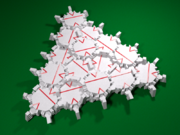Socolar–Taylor tile
The Socolar–Taylor tile is a single non-connected tile which is aperiodic on the Euclidean plane, meaning that it admits only non-periodic tilings of the plane (due to the Sierpinski's triangle-like tiling that occurs), with rotations and reflections of the tile allowed.[1] It is the first known example of a single aperiodic tile, or "einstein".[2] The basic version of the tile is a simple hexagon, with printed designs to enforce a local matching rule, regarding how the tiles may be placed.[3] It is currently unknown whether this rule may be geometrically implemented in two dimensions while keeping the tile a connected set.[2][3]
This is, however, confirmed to be possible in three dimensions, and, in their original paper, Socolar and Taylor suggest a three-dimensional analogue to the monotile.[1] Taylor and Socolar remark that the 3D monotile aperiodically tiles three-dimensional space. However the tile does allow tilings with a period, shifting one (non-periodic) two dimensional layer to the next, and so the tile is only "weakly aperiodic".
Physical copies of the three-dimensional tile could not be fitted together without allowing reflections, which would require access to four-dimensional space.[2][4]
Gallery
References
- ↑ 1.0 1.1 Socolar, Joshua E. S.; Taylor, Joan M. (2011), "An aperiodic hexagonal tile", Journal of Combinatorial Theory, Series A 118 (8): 2207–2231, doi:10.1016/j.jcta.2011.05.001.
- ↑ 2.0 2.1 2.2 Socolar, Joshua E. S.; Taylor, Joan M. (2012), "Forcing nonperiodicity with a single tile", The Mathematical Intelligencer 34 (1): 18–28, doi:10.1007/s00283-011-9255-y
- ↑ 3.0 3.1 Frettlöh, Dirk. "Hexagonal aperiodic monotile". http://tilings.math.uni-bielefeld.de/substitution/hexagonal-aperiodic-monotile.
- ↑ Harriss, Edmund. "Socolar and Taylor's Aperiodic Tile". http://maxwelldemon.com/2010/04/01/socolar_taylor_aperiodic_tile/.
External links
- Previewable digital models of the three-dimensional tile, suitable for 3D printing, at Thingiverse
- Original diagrams and further information on Joan Taylor's personal website
 |








